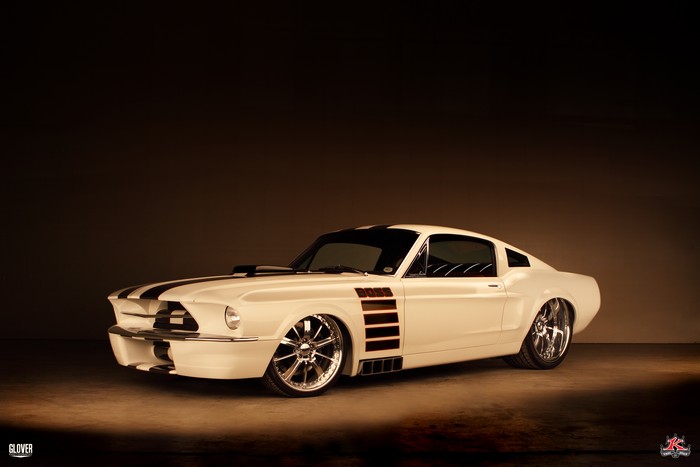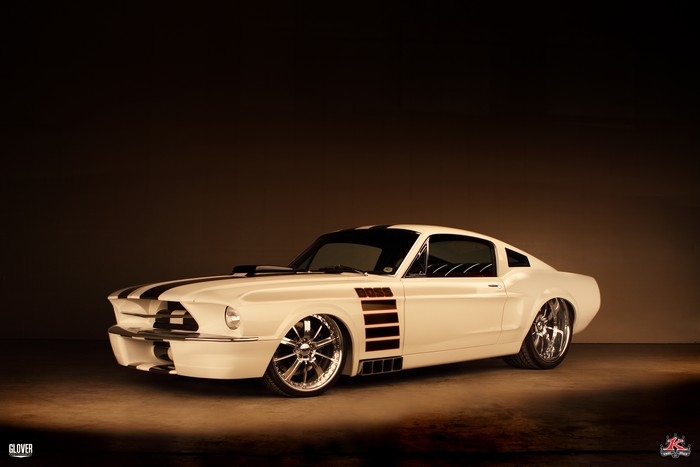
All new chassis-up, not restored. Artistic level of fit and finish. Supercharged 418-ci engine, 6-speed Tremec transmission and nine-inch rear end. 24x15 massive rear wheels, fully modern suspension and brakes. Custom interior. Massive sound system and functional “zoomie” exhaust activated from center console. Custom fabricated up-down license plate holder. Custom integrated gas cap and 2005 Mustang GT gauges. Magazine cover, show quality. Best in Show, Utah Autorama 2009. Top Finisher 2009 Good Guys Nationals.
(Introductory description courtesy of Barrett-Jackson.)
SCM Analysis
Detailing
| Vehicle: | 1968 Ford Mustang “The Boss” Custom fastback |
| Years Produced: | 1968 |
| Number Produced: | 42,581 fastbacks |
| Original List Price: | $3,081 |
| SCM Valuation: | $275k for this car on this day |
| Tune Up Cost: | $250 |
| Distributor Caps: | $25 |
| Chassis Number Location: | N/A |
| Engine Number Location: | N/A |
| Club Info: | Goodguys Rod |
| Website: | www.good-guys.com |
| Alternatives: | 1969 Chevrolet Camaro custom, 1970 Plymouth Barracuda custom, 1968 Dodge Charger custom |
| Investment Grade: | C |
This full-custom 1968 Mustang, Lot 651, sold for a remarkable $275,000, including buyer’s premium, at Barrett-Jackson’s Las Vegas sale September 20–22, 2012.
High and tight
A custom car is a lot like a custom suit. Sure, it fits you like a glove and announces to all the world that yes, you are man enough to wear salmon seersucker. But how reasonable would it be to expect to cross paths with another 42-inch waist and 30-inch inseam that simply must have that fishy combo for summer cocktails? Not a similar suit. Not a suit by the same tailor. Your suit. And he doesn’t care what it costs.
Custom cars, like custom suits, are rarely, if ever, inspire by return on investment. They are personal expressions of creativity and craftsmanship that are direct reflections of the owner’s and/or builder’s desire to separate himself from the masses.
The cars themselves take on new identities, and often names (e.g. Sniper, Frankencuda, Cadzilla), and connections to a life prior to the transformation are often all but forgotten. In doing so, customs often lose any value tied to what they were, and are then held up by what they are. When you measure a custom car like that, without its history as a factory Camaro, or Mustang, or ’Cuda, or whatever, pinning a dollar value to it gets tricky.
Because customs must stand on their own, their legacies, and subsequent values, need to be earned one trophy or magazine article at a time. Our subject car has managed to accumulate a number of awards in its five or so years on the show circuit, with perhaps the most important being its inclusion in the list of top five finalists for the 2009 Goodguys’ Street Machine of the Year.
First-class, but not first place
Although the competition for the rod and custom club’s recognition in the SMoY category has grown increasingly cutting edge and often has instant market influence, I need to reiterate that our subject was a finalist and not a winner (that year’s winner, a ’62 Corvette, was a no-sale at $250,000 at Mecum’s Dallas, TX, auction in September of this year — ACC# 213101).
For comparison, a 1970 Challenger that was a SMoY finalist in 2010 (and built by the same guys who built the 2009 winner) sold at Barrett-Jackson’s Scottsdale sale for $176,000 in 2011, and then again for $82,500 in 2012 (ACC# 193565). The second sale was a screaming deal, but it’s indicative of the what-have-you-done-for-me-lately world of show cars and next-best things.
Build-quality as a market factor
Typically, the skill and reputation of the builder plays heavily into the dollar value of customs. Big names attached to a build can often push a car’s price significantly higher than a comparable car built in a lesser-known shop.
The Ring brothers, now famous for their instantly recognizable style and attention to detail, are a perfect example. Their 1967 Mustang, dubbed “Reactor,” debuted in 2006, and is aesthetically pedestrian when compared with their more current offerings. However, Reactor managed a hefty $253,000 at Barrett-Jackson’s 2010 Scottsdale sale. High-quality cars often manage to sell themselves regardless of whose name is on the title, and when the right buyers are in the room, prices like this aren’t unheard of.
A custom street machine like “The Boss” needs to also meet an industry-standard list of pricey prerequisites to be taken seriously. The spec sheet here includes an Art Morrison chassis, a supercharged small-block Ford that makes a reported 992 hp at the crank, 6-speed tranny, two exhaust systems, and giant brakes. But it’s those mammoth 24-inch rear wheels that make the car memorable.
The builder, Kindig-It Design, reportedly started with a pair of Mustang door jambs, a roof panel, the top of a cowl, and half a quarter panel for this car’s build. They were given free license with the design, and the Mustang’s body was tastefully crafted to accommodate those meats while skillfully managing to avoid what could have become an obnoxious combination. However, based on the Mustang’s performance on the autocross (a requisite of the SMoY competition), those big fatties pack a lot more bark than bite.
Was it worth it?
There is no denying that this Mustang has curb appeal oozing out of those zoomies, and that unexpectedly sharp paint job is worn with a certain reserved flamboyance. But $275,000 is a huge number.
This sale seems to contradict the conventional wisdom of pasturing out-of-their-prime show cars. But the market is a fluid thing, and we’ve been seeing more and more customs bring big prices at high-end auctions such as Barrett-Jackson. Will they see growth in the future? It’s hard to say, but it also isn’t really the point for a buyer looking to have the coolest show car in his state without the 12- to 24-month wait that comes with having one built.
Our buyer has managed to save himself a lot of time and anxiety over building something similar, and even at $275k, I’m willing to bet he still saved a little money over what it would have cost to commission his own custom. Maybe long-term value, in this case at least, has little to do with financial return — especially if the buyer had lusted after “The Boss” specifically since its SMoY finalist days. And he can take the car out and use it today. No waiting required.
The money spent for this Mustang wasn’t earmarked for a last-chance lottery ticket. This sale was clearly a gotta-have moment, and in the flashy over-the-top custom-car market, sometimes that’s all the motivation a buyer needs.
